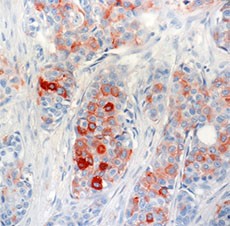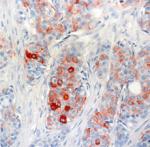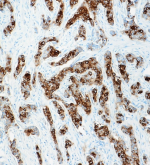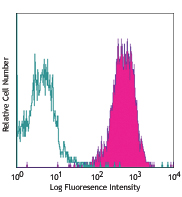- Clone
- D6 (See other available formats)
- Regulatory Status
- IVD
- Isotype
- Mouse IgG2a, κ

-

Staining of BRST-2 (GCDFP-15, clone D6) on formalin fixed paraffin embedded human breast tumor tissue. -

-

The BRST-2 antigen is expressed by apocrine sweat glands, eccrine glands (variable), minor salivary glands, bronchial glands, metaplasmic epithelium of the breast, benign sweat gland tumors of the skin and the serous cells of the submandibular gland. Breast carcinomas (primary and metastatic lesions) with apocrine features express the BRST-2 antigen.
This antibody is effective in immunohistochemistry (IHC).
The BRST-2 clone D6 recognizes a 15 kD glycoprotein known as Gross Cystic Disease Fluid Protein-15 (GCDFP-15).
Concentrated Format:
Cat. No. 915101 (Formerly: SIG-3611-1000) [1 mL]
Prediluted Formats:
Cat. No. 915102 (Formerly: SIG-3611-16) [6 mL Level 1] is ready to use with with automated strainers with Biotin-based detection systems such as USA Ultra Streptavidin Detection (Cat. No. 929501).
Cat. No. 915103 (Formerly: SIG-3611-26) [6 mL Level 2] is ready-to-use with Biotin-based detection systems such as USA Ultra Streptavidin Detection (Cat. No. 929501).
Product Details
- Product Information
-
Intended Use:
In Vitro Diagnostic (IVD). Use in immunohistochemistry (IHC) test methods only.
The monoclonal antibody D6 is used for the in vitro examination of paraffin-embedded tissue sections of human breast carcinoma samples using immunohistochemistry (IHC) methods for the qualitative identification of GCDFP-15. The clinical interpretation of any staining or its absence should be complemented by morphological studies and proper controls and should be evaluated within the context of the patient's clinical history and other diagnostic tests by a qualified pathologist.
- Reactivity
- Human
- Immunogen
- This antibody was generated against a gross cystic disease fluid protein 15.
- Formulation
- Phosphate-buffered solution with BSA + 0.1% NaN3.
- Preparation
- The antibody was purified by affinity chromatography.
- Storage & Handling
- Store between 2°C and 8°C.
- Recommended Usage
-
Each lot of this antibody is quality control tested by immunohistochemical staining of formalin-fixed paraffin-embedded breast cancer tissue sections.
The optimal working dilution should be determined for each specific assay condition.
• IHC: ≥1:40 (concentrated format) with Biotin based detection systems such as USA Ultra Streptavidin Detection (Cat. No. 929501).
Positive tissue (human): Axilla or breast carcinoma
Tissue Sections: Formalin-fixed, paraffin-embedded tissues
Pretreatment: Not required. The BRST-2 epitope is heat-sensitive; paraffin sections that have been heat fixed at 60°C may lose antibody binding sites.
Incubation: 20-60 minutes at room temperature -
Application References
(PubMed link indicates BioLegend citation) -
- Fan CY, et al. Expression of androgen receptor and prostatic specific markers in salivary duct carcinoma: an immunohistochemical analysis of 13 cases and review of the literature. Am J Surg Pathol 24(4):579-586, 2000.
- Wick MR, et al. Gross cystic disease fluid protein-15 as a marker for breast cancer: immunohistochemical analysis of 690 human neoplasms and comparison with alpha-lactalbumin. Human Path 20(3):281-287, 1989.
- Haagensen CD. Disease of the breast. 3rd ed., 250-267. W. B. Saunders Co. Philadelphia, PA, 1986.
- Mazoujian, G, et al. Extramammary paget's disease - evidence for an apocrine origin. Am J. Surg. Pathol. 8(1):43-50, 1984.
- Mazoujian G, et al. Immunohistochemistry of a breast gross cystic disease fluid protein (GCDFP-15): a marker of apocrine epthelium and breast carcinomas with apocrine features. Am J Pathol 110:105-111, 1983.
- RRID
-
AB_2565163 (BioLegend Cat. No. 915103)
AB_2565162 (BioLegend Cat. No. 915102)
AB_2565161 (BioLegend Cat. No. 915101)
- Disclaimer
-
WARNINGS AND PRECAUTIONS
- Use appropriate personal protective equipment and safety practices per universal precautions when working with this reagent. Refer to the reagent safety data sheet.
- This antibody contains sodium azide. Follow federal, state and local regulations to dispose of this reagent. Sodium azide build-up in metal wastepipes may lead to explosive conditions; if disposing of reagent down wastepipes, flush with water after disposal.
- All specimens, samples and any material coming in contact with them should be considered potentially infectious and should be disposed of with proper precautions and in accordance with federal, state and local regulations.
- Do not use this reagent beyond the expiration date stated on the label.
- Do not use this reagent if it appears cloudy or if there is any change in the appearance of the reagent as these may be indication of possible deterioration.
Related FAQs
Customers Also Purchased
Compare Data Across All Formats
This data display is provided for general comparisons between formats.
Your actual data may vary due to variations in samples, target cells, instruments and their settings, staining conditions, and other factors.
If you need assistance with selecting the best format contact our expert technical support team.
-
BRST-2 (GCDFP-15) Monoclonal Antibody, Purified

Staining of BRST-2 (GCDFP-15, clone D6) on formalin fixed pa... 

-
Purified anti-BRST-2 (GCDFP-15)

IHC staining of anti-BRST-2 (GCDFP-15) antibody (clone D6) o...
 Login / Register
Login / Register 








Follow Us